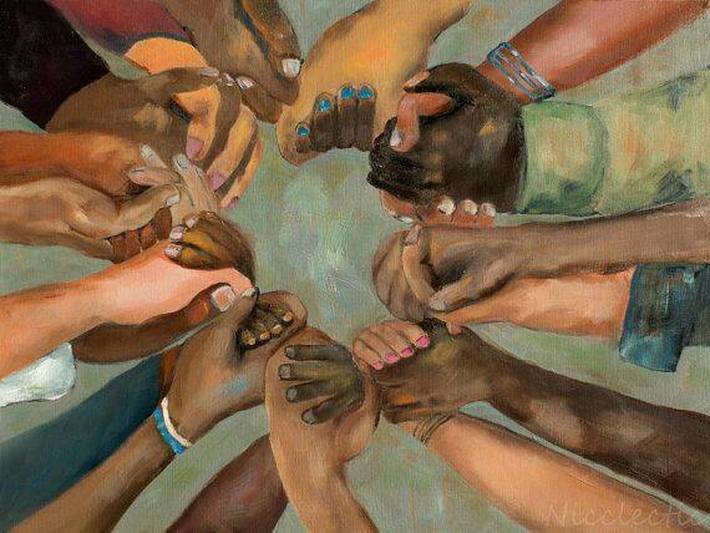|
How can people of different races, cultures and religions live together in peace?
In the Old Testament, Jews followed a straight set of dietary laws, treating certain foods as unclean. This practice signified cleanliness before God and helped them maintain their identity apart from surrounding cultures. But after Christ, our cleansing is through Him. Food is neutral, neither clean nor unclean (Romans 14:14). Even so, many early Christians struggled with this change in centuries worth of custom and habits. Early Christians also argued over whether they could eat food blessed by pagan priests. To Paul, such worry showed a weakness in their faith (1 Corinthians 8). Some consider certain paths to be right. They might despise those outside, and consider them as immoral and too liberal, with no courage of conviction. They may even resort to violence to force others to follow. Some think that there is no absolute truth. To them, all roads lead to Rome. They despise those who claim otherwise and consider them narrow-minded, intolerant, and uncivilized. Racial, cultural, and religious differences have created lots of conflicts. Different views from diverse groups could help us see the different aspects of God, but conflicting views can’t all be true. How do we deal with the inherent conflicts? Romans 14 teaches us that we must evaluate to separate right from wrong. But those on the right path should welcome the weak and shouldn’t use arguments to change them (14:1). Instead, we should patiently listen to the other camp and build deep relationships with them, gradually encouraging them to listen to our side. Learn from Christ. He condemns our sin, but He still stepped down from heaven to build deep relationships with us, the sinners. Because of Christ, our status before God is not based on our behavior, but rather on what Christ has done for us. Because of Christ, we know God loves us, and our future in the new heaven and earth is assured. God’s assurance has given us hope and the fortitude to change. We can build deep relationships with those against Him and gradually show them His love. Adapted from a Tim Keller sermon http://www.gospelinlife.com/free-sermon-resource https://gospelinlife.com/downloads/hope-race-and-power-5357/ 不同种族,文化和宗教的人如何和平共处? 在旧约时期,犹太人遵循一系列嚴格的饮食规条,将某些食物视为不洁。这种做法表示在上帝面前洁净自己,并有助于保持他们的身份,与四周的文化分别出来。但在基督之后,我们通过祂得到洁净。食物本身是中性的, 没有干净或不净的分别(罗马书14:14)。然而,改变数百年的习俗和传统是困难的。许多早期的基督徒为此而挣扎。 早期的基督徒也争论是否能吃异教祭司祝福过的食物。对保罗而言,这种担忧表明了他们信仰的软弱(哥林多前书8)。 有些人认为某些道路是正确的,鄙视那些在这些道路以外的人,视之为不道德, 过于自由,对信念没有勇气。他们甚至可能诉诸暴力迫使他人跟从自己。 还有些人认为没有绝对真理,条条大路通罗马,鄙视那些不接受这样看法的人,认为这些人头脑狭窄,不宽容,不文明。 种族,文化和宗教差异造成了许多冲突。来自多样化群体的不同观点可以帮助我们看到上帝不同的层面。但互相矛盾的观点不可能都是真理。如何处理这些内在冲突呢? 罗马书十四章教导我们必须评估对错, 将对与错分开。但是,那些走在正路上的人应该接纳软弱者,不应用争辩来改变他们(罗马书 14:1)。相反地,我们应该耐心地聆听另一方,与其建立深厚的关系, 逐渐地鼓励他们聆听我们的观点。 我们当向向基督学习。 祂谴责我们的罪过,但依然从高天降下, 来到世间,与我们这群罪人建立深厚的关系。 因为基督, 我们在神面前的地位不是基于自己的行为,而是取决于基督为我们所做的事。 因为基督, 我们知道上帝对我们的爱,明白我们在新天新地的未来得到了保证。 上帝的保证带来盼望,带来勇气改变自己。这样就可以与反对上帝的人建立深厚的关系,渐渐地将上帝的爱显明给他们。
0 Comments
Leave a Reply. |
Categories
All
|
Proudly powered by Weebly
